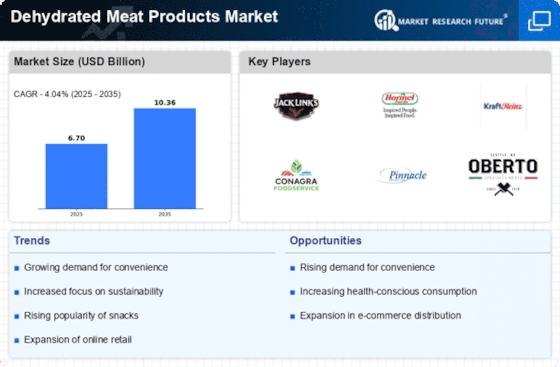Top Industry Leaders in the Dehydrated Meat Products Market

The dehydrated meat products market plays a pivotal role in the global food industry, meeting the demand for convenient and long-lasting meat options. Key players in this market strategically position themselves to cater to the evolving preferences of consumers seeking portable and shelf-stable meat products. This analysis provides an overview of the competitive landscape, covering key players, strategies, market share factors, emerging companies, industry news, current investment trends, and a notable development in 2023.
Key Players:
Cargill, Inc. (U.S.)
Henningsen Foods, Inc. (U.S.)
Hormel Foods (U.S.)
Kerry Group plc. (Ireland)
Marfrig Group (Brazil)
BRF S.A. (Brazil)
Associated British Foods Plc (U.K)
Marfrig Group (Brazil)
Tyson Foods, Inc. (U.S.)
Pinnacle Foods Group LLC (U.S.)
Pilgrim’s Pride Corporation (U.S.)
Strategies Adopted:
The dehydrated meat products market adopt various strategies to maintain and enhance their market positions. Strategies include product diversification to cater to different tastes and preferences, international expansion to tap into emerging markets, and investments in research and development to improve dehydration technologies. For example, Tyson Foods, Inc. has been focusing on sustainability initiatives by investing in energy-efficient dehydration processes, aligning with consumer preferences for environmentally responsible products. Such strategies contribute not only to meeting consumer demands but also help companies differentiate themselves in a competitive market.
Market Share Analysis:
The dehydrated meat products market involves evaluating multiple factors impacting competitive positioning. Key considerations include the quality and taste of dehydrated meat products, adherence to safety standards, distribution efficiency, brand strength, and the ability to offer a diverse range of products. Companies that effectively balance these factors are better positioned to capture and retain a significant share of the market. Additionally, factors such as compliance with industry regulations, effective marketing strategies, and responsiveness to emerging consumer trends contribute to market differentiation and influence consumer choices.
News & Emerging Companies:
The dehydrated meat products market has seen the emergence of new and innovative companies, reflecting the industry's adaptability and potential for growth. In 2023, emerging players like Jerky Co. entered the market with unique formulations of dehydrated meat snacks, gaining attention for their focus on natural and preservative-free solutions. These newcomers contribute to the market's diversity, challenging established players and fostering innovation in the dehydrated meat products sector.
Industry Trends:
The dehydrated meat products market revolve around innovation, sustainability, and addressing the demand for healthier options. Key players are investing in research and development to create novel dehydration techniques that retain the flavor and nutritional profile of meats, exploring advanced packaging solutions to enhance product shelf life, and adopting sustainable sourcing practices to meet the rising demand for ethically sourced meat products. Additionally, investments in marketing and promotional activities contribute to building awareness about the benefits of dehydrated meat products and increasing their adoption across various consumer segments.
Current investment trends also highlight the importance of meeting dietary preferences. Companies are investing in developing dehydrated meat products that cater to specific dietary requirements, such as low-carb or high-protein diets. The customization of product offerings aligns with the growing awareness of health-conscious consumers, contributing to the overall market appeal of dehydrated meat snacks.
Competitive Scenario:
The dehydrated meat products market is marked by robust competition among key players striving to establish themselves as leaders in this dynamic sector. Companies differentiate themselves through a combination of product quality, innovation, sustainability practices, and a keen understanding of diverse market needs. The market is also influenced by factors such as global distribution networks, research and development capabilities, and the ability to adapt to changing consumer preferences, especially in an industry where taste and convenience are paramount.
Recent Development
The dehydrated meat products market was Hormel Foods Corporation's acquisition of a leading plant-based meat company. This strategic move marked a response to the increasing consumer demand for alternative protein sources and diversified product portfolios. The acquisition allowed Hormel Foods Corporation to expand its presence in both traditional and plant-based protein markets, positioning the company as a comprehensive supplier of protein-rich options.
Hormel Foods Corporation's strategic acquisition underscored the importance of diversification in meeting evolving consumer preferences. The development positioned the company not only as a global supplier of conventional dehydrated meat products but also as a player actively participating in the growing market for plant-based alternatives. This move not only enhanced Hormel Foods Corporation's market presence but also contributed to shaping the dehydrated meat products market by recognizing and capitalizing on the shift towards alternative protein sources.











